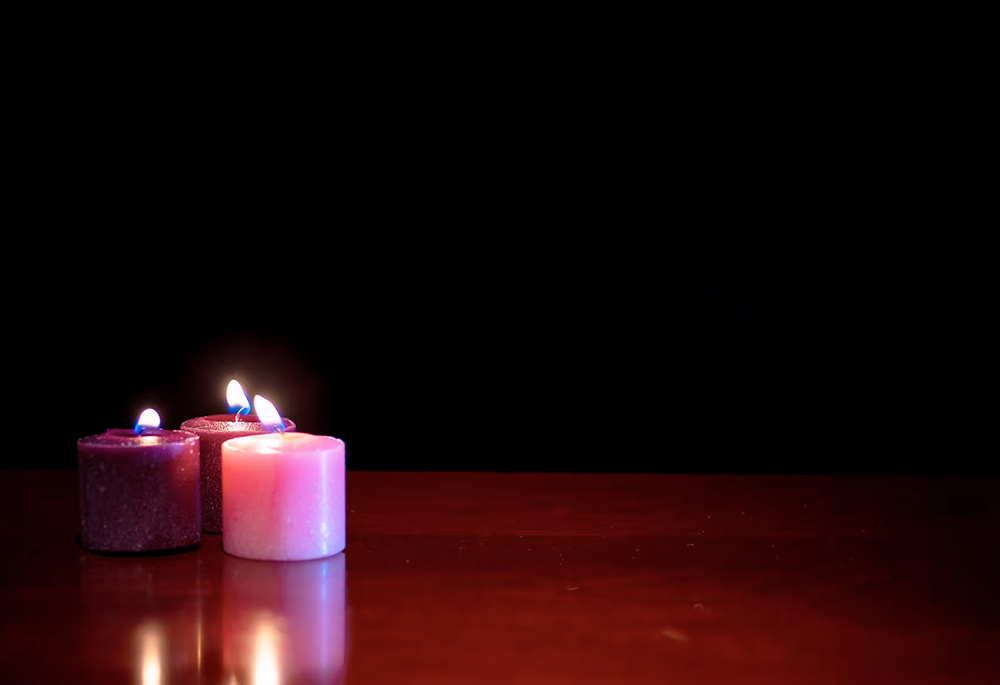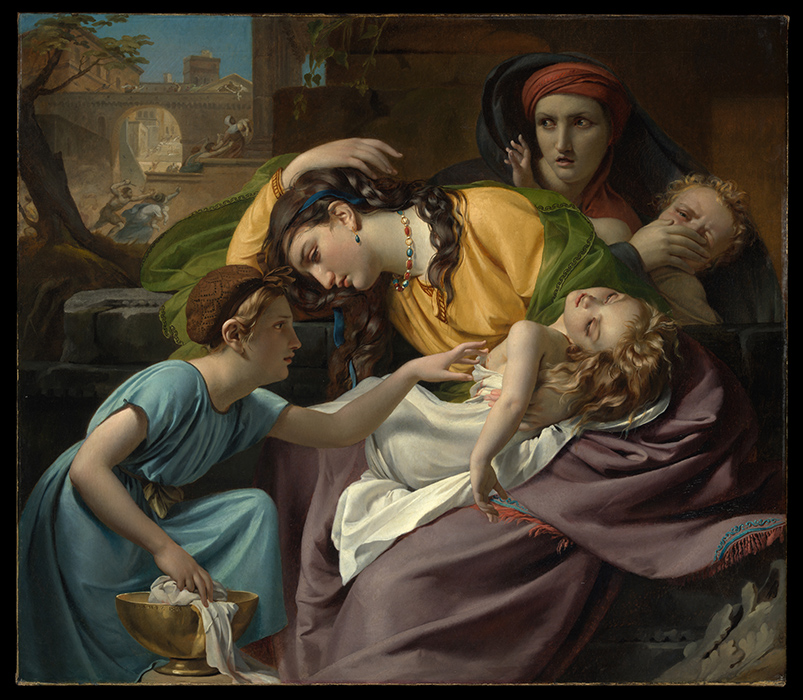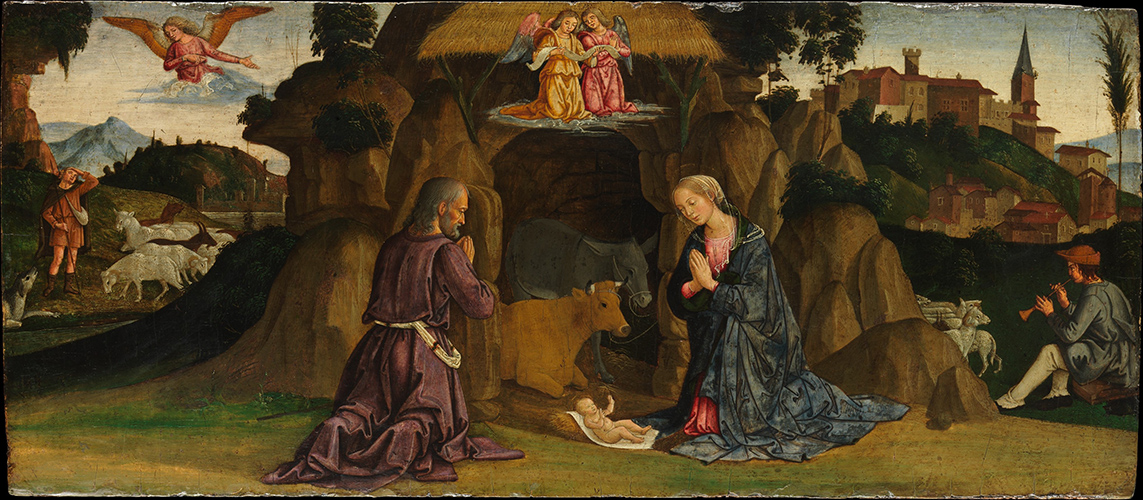
"The Flight into Egypt," circa 1470s painting by Cosmè Tura (Metropolitan Museum of Art)
Advent is my favorite season of the liturgical year: amid shadows and waiting, we are promised that joy is coming to the world. But this year, I've had difficulty getting into the Advent spirit. It's hard to believe those optimistic promises, knowing that next year is likely to bring hardship to many.
With a second Trump administration impending, immigrants fear discrimination and deportation; the chronically ill worry that they will lose their health care; LGBTQ+ people fear an increasing culture of hate and harassment; Black Americans are concerned about a reversal of progress on civil rights; women wonder if they should risk pregnancy, given attacks on reproductive health care. In this political landscape, hope and joy don't feel rational. They feel delusional.
Of course, difficulties are always a part of life, even in our relatively privileged nation. At no point in history has Advent arrived in a world of tranquil happiness. So, what makes this year any different?
Well, the coming hardships will not be accidental. Rather than choosing to mend rifts and work for justice, 77 million voters chose to sacrifice the vulnerable among us for the sake of a (perceived) economic boost. It's hard enough knowing a bad thing was preventable; knowing it was deliberate is even worse.

(Unsplash/Robert Thiemann)
In church this month we hear stories about the birth of Jesus and admonitions to "shout for joy" and "give thanks" for the coming of a savior. "The peace of God that surpasses all understanding will guard your hearts and minds in Christ Jesus," Paul assures us in Philippians.
But we will also hear stories of terror and violence. Herod, vain and insecure, orders a massacre. Mary and Joseph defy authority and flee the country to save Jesus. Millions of Christians who listen to these readings will see no issue with the fact that they voted for mass deportations that will put innocent families in harm's way. Whatever their rationale, they cast their vote for Herod.
So, yes, I have trouble feeling hopeful.

"The Massacre of the Innocents," an 1824 painting by François Joseph Navez (Metropolitan Museum of Art)
But joy isn't the only theme of the season. Along with the popular readings that proclaim good news, Advent Scripture readings also offer warnings of divine wrath. Often overlooked amid the holiday music and cheering decor, talk of apocalypse and judgment dot the landscape of December Masses.
This year, Advent kicked off with Jesus' warning in Luke: "People will die of fright in anticipation of what is coming upon the world, for the powers of the heavens will be shaken." A few days later, we hear from Isaiah: "For the tyrant will be no more, and the arrogant will have gone; All who are alert to do evil will be cut off." And on the third Sunday of Advent, John the Baptist spoke of the coming of Jesus: "His winnowing fan is in his hand to clear his threshing floor and to gather the wheat into his barn, but the chaff he will burn with unquenchable fire."
When church choirs perform the Christmas portions of Handel's "Messiah," we'll hear that "Every valley shall be exalted, and every mountain and hill made low" and "Who may abide the day of his coming? And who shall stand when he appeareth?" In the Magnificat, we hear similar things from Mary: "He has brought down the powerful from their thrones, and lifted up the lowly; he has filled the hungry with good things, and sent the rich away empty."
Advertisement
Progressive Catholics are accustomed to passing by verses about wrath and judgment, preferring to emphasize mercy and bridge-building instead. Most peace-loving Christians are uneasy with these images of fire and judgment, viewing them as relics of an older and more violent age and knowing they have been historically abused as justification for violence against the marginalized.
But these two aspects of the Advent message — peace on one hand, vengeance on the other — actually belong together. These passages don't say that God is coming to judge immigrants, poor people or queer people. Divine judgment is intended for powerful, wealthy oppressors. And at a time when oppressive powers seem to be unchecked in our church, our nation and our world, these Scripture passages beseeching God to bring down justice don't feel archaic. They feel validating.
Our discomfort with the image of an angry God may be a component of our privilege. Liberation theology offers insights into this. James Cone, in A Black Theology of Liberation, argues that divine wrath is a component of divine love. And liberation theologian José Miguez Bonino writes that "God's righteous power is affirmed in the midst of conflict. God is engaged in a struggle — his power is manifest in this struggle and is the guarantee of the final triumph of that righteousness of God" (Toward a Christian Political Ethics).
Jewish theology can also help us appreciate the validity of longing for justice. The Jewish tradition tends to be more comfortable with the idea of a God of vengeance, not because Judaism is less sophisticated, but because the Jewish people have repeatedly been oppressed and exiled over centuries. As Rabbi Shai Held points out in an interview for U.S. Catholic, "It is easier for a tradition that has historically had a lot of power to talk about love of enemies than it is for people who have struggled to survive for centuries."

"The Nativity," circa 1480s painting by Antoniazzo Romano (Metropolitan Museum of Art)
I enjoy relative degrees of privilege as a middle-class, married heterosexual citizen, a Christian in a nation that gives preference to Christians. Nevertheless, as a working person who has experienced financial hardship, I expect to see my life get harder in the next few years, precisely because of the choices made by my fellow Christians. And others less privileged than myself will bear the brunt of MAGA scapegoating. Messages assuring us that "it's in God's hands" are hardly encouraging when we think of the countless people throughout history who were ethical, even heroically virtuous, and were brutally harmed anyway.
But I do find comfort in those old Scripture passages from thousands of years ago, vivid descriptions composed by Jewish prophets and poets who looked forward to the coming of a God of wrath who would bring judgment on the powerful and set the captives free. An angry God may be threatening to the wealthy and the oppressors. But for the oppressed, and for those who work for justice, an angry God is a defender.
An angry God may be threatening to the wealthy and the oppressors. But for the oppressed, and for those who work for justice, an angry God is a defender.
We need this Advent image of an avenging God; not so we can give up, assuming injustice will be magicked away in another life. And not so we can ignore reality or turn aside from the vulnerable, but so that we continue to do the work God has called us to do, whether as teachers, activists, organizers or healers. We each can answer this call. For the helpless baby in the manger is also the God who comes with a winnowing fan and a refining fire to set the captives free.





